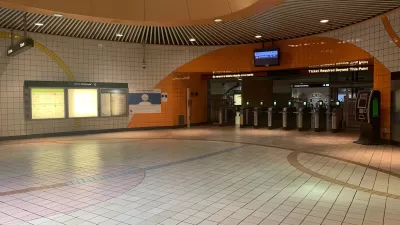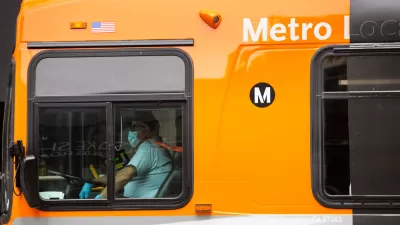Laura Bliss argues that rather than promise to reduce congestion, Los Angeles Metro should embrace its real beneficiaries: non-drivers.
Los Angeles County Metro's ambitious plans for the next 40-50 years rely on $120 billion from a proposed sales tax. Laura Bliss writes in CityLab that to win voter approval, the MTA needs to reassess how it presents the core purpose of building transit.
Transit advocacy, including Metro's own, often relies on the idea that access to transportation options reduces driving, which reduces congestion, which reduces carbon emissions.
But plenty of factors affect transit ridership rates that agencies cannot control—land-use planning and density, gas prices, free parking and other invisible driving subsidies, etc.—and research has disputed whether increased transit options really do replace driving. Bliss argues that they shouldn't have to:
"Transit doesn’t have to reduce traffic to be successful. Indeed, its central aim probably shouldn’t be serving the people who don’t actually use it. Transit’s best selling point is that it offers mobility to those who, for any number of reasons, can’t or choose not to drive. It also underpins bustling economic activity, pushes people into job centers, and improves long-term sustainability."
Embracing that angle could increase agencies' success, or even alter their project priorities—and go a long way toward clarifying the issues facing Los Angeles and other U.S. cities.
FULL STORY: To Ease Traffic, L.A. Needs Much More Than Trains

Alabama: Trump Terminates Settlements for Black Communities Harmed By Raw Sewage
Trump deemed the landmark civil rights agreement “illegal DEI and environmental justice policy.”

Planetizen Federal Action Tracker
A weekly monitor of how Trump’s orders and actions are impacting planners and planning in America.

The 120 Year Old Tiny Home Villages That Sheltered San Francisco’s Earthquake Refugees
More than a century ago, San Francisco mobilized to house thousands of residents displaced by the 1906 earthquake. Could their strategy offer a model for the present?

Opinion: California’s SB 79 Would Improve Housing Affordability and Transit Access
A proposed bill would legalize transit-oriented development statewide.

Record Temperatures Prompt Push for Environmental Justice Bills
Nevada legislators are proposing laws that would mandate heat mitigation measures to protect residents from the impacts of extreme heat.

Downtown Pittsburgh Set to Gain 1,300 New Housing Units
Pittsburgh’s office buildings, many of which date back to the early 20th century, are prime candidates for conversion to housing.
Urban Design for Planners 1: Software Tools
This six-course series explores essential urban design concepts using open source software and equips planners with the tools they need to participate fully in the urban design process.
Planning for Universal Design
Learn the tools for implementing Universal Design in planning regulations.
Clanton & Associates, Inc.
Jessamine County Fiscal Court
Institute for Housing and Urban Development Studies (IHS)
City of Grandview
Harvard GSD Executive Education
Toledo-Lucas County Plan Commissions
Salt Lake City
NYU Wagner Graduate School of Public Service




























